Voila. I did it. After all that talk, I finally put my money where my mouth is and bought myself a kindle. And though it was a rough ride (delivered it to the wrong address; mother almost claimed it for her prize), it’s finally in my possession, shiny and new and smelling like plastic rather than ink and paper.
I’m excited and have absolutely no clue what I plan to read first. I’m currently enthralled by Adam Gopnik’s rolling prose and insightful observations of the ever frivolous French in “Paris to the Moon.” But it’s a physical book, so there’s no rush to just immediately use the kindle.
Instead, I’ve been thinking about what’s next. What will be the first thing I read on my beloved device? What book could possibly deserve the honors?
I’ll warn you that I still haven’t decided. I’m thinking either a fluffy beach read (if the weather ever bothers to warm up) or something Hemingway or France-related. We’ll see. But in my thinking and research, I came across the following sites that offer insightful suggestions for confused readers.
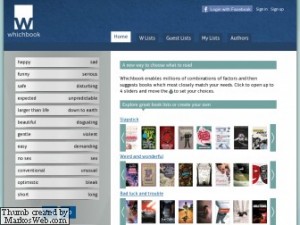 WhichBook.net is by far my favorite resource because its so interactive and suggests books that I’ve never heard of. In short, the site offers various filter “sliders.” Readers can adjust to four factors (samples include length, sexuality, happy or sad, etc.) to specify their tastes, and generate recommendations. The titles–as far as I’ve seen–are small-name books that I oftentimes have never heard of, but who’s to say they aren’t small-name gems? This site is best if you literally don’t have any jumping off point, or if you want to delve into a new style, genre, amount of sex, etc. If the generator doesn’t peak your interest, there are also numerous lists (by both administrators and users) from which to draw inspiration.
WhichBook.net is by far my favorite resource because its so interactive and suggests books that I’ve never heard of. In short, the site offers various filter “sliders.” Readers can adjust to four factors (samples include length, sexuality, happy or sad, etc.) to specify their tastes, and generate recommendations. The titles–as far as I’ve seen–are small-name books that I oftentimes have never heard of, but who’s to say they aren’t small-name gems? This site is best if you literally don’t have any jumping off point, or if you want to delve into a new style, genre, amount of sex, etc. If the generator doesn’t peak your interest, there are also numerous lists (by both administrators and users) from which to draw inspiration.
 WhatShouldIReadNext.com is also promising. And, yes, I found this by Googling literally “What should I read next?” (Google can be so inspiring!). This site takes a book you know you like and then offers suggestions. It’s nice because you can enter numerous personal favorites and get a wide selection of recommended reads. The downside, of course, is that you get a wide selection of recommended reads, and they’re based largely on similar subjects, rather than similar styles and quality. It’s a simple site, as well, not particularly interactive, and if you want to actually purchase a book, you’ll have to go to amazon or some other site all by yourself.
WhatShouldIReadNext.com is also promising. And, yes, I found this by Googling literally “What should I read next?” (Google can be so inspiring!). This site takes a book you know you like and then offers suggestions. It’s nice because you can enter numerous personal favorites and get a wide selection of recommended reads. The downside, of course, is that you get a wide selection of recommended reads, and they’re based largely on similar subjects, rather than similar styles and quality. It’s a simple site, as well, not particularly interactive, and if you want to actually purchase a book, you’ll have to go to amazon or some other site all by yourself.
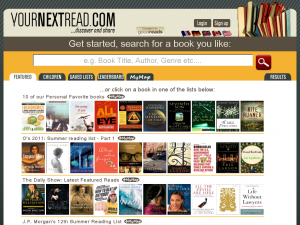 YourNextRead.com does the same thing as WhatShouldIReadNext, but takes it to another level. First off, the site looks better and is more interactive (always a plus–I still judge a book by its cover). But the recommendations are more insightful and spot on, based more on similar quality and style than similar keywords. Also, YourNextRead has the “My Maps” function, which is a visual representation of connections between books. Use it to make a personal “My Map,” or search popular non-fiction and fiction–I wish I’d used this in my AP Lit class in high school, so I could avoid reading anything existential. An added bonus? The more you use the site, the more accurate and tailored the recommendations are.
YourNextRead.com does the same thing as WhatShouldIReadNext, but takes it to another level. First off, the site looks better and is more interactive (always a plus–I still judge a book by its cover). But the recommendations are more insightful and spot on, based more on similar quality and style than similar keywords. Also, YourNextRead has the “My Maps” function, which is a visual representation of connections between books. Use it to make a personal “My Map,” or search popular non-fiction and fiction–I wish I’d used this in my AP Lit class in high school, so I could avoid reading anything existential. An added bonus? The more you use the site, the more accurate and tailored the recommendations are.
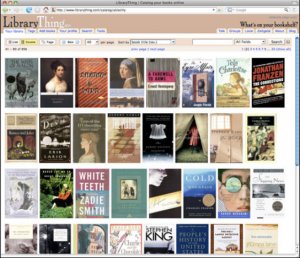 LibraryThing.com is a cataloging program that allows users (and yes, you must register as a user) to list favorite books, books they’ve read, etc. Readers can also review books and help with public cataloging. Plus, the site connects you with other users with freakishly similar tastes. Think of it as a huge, nerdy book club. It’s worth noting, too, that LibraryThing’s recommendations are not based on popularity; they’re based on similarity. But what really sets LibraryThing apart is (a) its “unsuggester,” which allows you to enter a book and it then generates books least likely to be related; and (b) its cataloging function. Users can catalog their entire (real life) library to keep tabs on their belongings, use for insurance claims, and even to Dewey-decimal-ize their nerdy collections. The sky’s the limit.
LibraryThing.com is a cataloging program that allows users (and yes, you must register as a user) to list favorite books, books they’ve read, etc. Readers can also review books and help with public cataloging. Plus, the site connects you with other users with freakishly similar tastes. Think of it as a huge, nerdy book club. It’s worth noting, too, that LibraryThing’s recommendations are not based on popularity; they’re based on similarity. But what really sets LibraryThing apart is (a) its “unsuggester,” which allows you to enter a book and it then generates books least likely to be related; and (b) its cataloging function. Users can catalog their entire (real life) library to keep tabs on their belongings, use for insurance claims, and even to Dewey-decimal-ize their nerdy collections. The sky’s the limit.
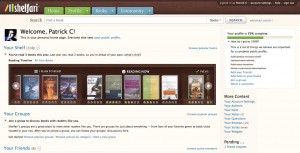 Shelfari.com is a crowdsourced library, like Wikipedia for books. Like LibraryThing, you can build “virtual bookshelves,” catalog your books, and sort them into various categories (already read, want to read, wish list). But because Shelfari is connected to amazon.com, you can actually jump-start the cataloging process by importing your amazon purchases–including kindle books. You can also discover new books based on your taste. But the crowdsourcing feature comes from being able to edit book extras. Edit plot summaries, favorite quotations, character descriptions. It’s like a pretty little mashup of Wikipedia, a bookstore, and Spark Notes all in one. Plus you can make and join groups, to discuss books (or pizza. Whatever).
Shelfari.com is a crowdsourced library, like Wikipedia for books. Like LibraryThing, you can build “virtual bookshelves,” catalog your books, and sort them into various categories (already read, want to read, wish list). But because Shelfari is connected to amazon.com, you can actually jump-start the cataloging process by importing your amazon purchases–including kindle books. You can also discover new books based on your taste. But the crowdsourcing feature comes from being able to edit book extras. Edit plot summaries, favorite quotations, character descriptions. It’s like a pretty little mashup of Wikipedia, a bookstore, and Spark Notes all in one. Plus you can make and join groups, to discuss books (or pizza. Whatever).
Happy reading, friends. I’ll post some reviews and “What I’m Reading”‘s when I finally decide which is next. I hope this kindle deal will be amazing!! Even if it lacks the ink-and-paper-and-mold smell of real books.











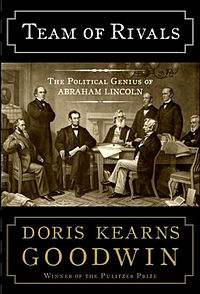
I have started using goodreads.com. Great site, too.